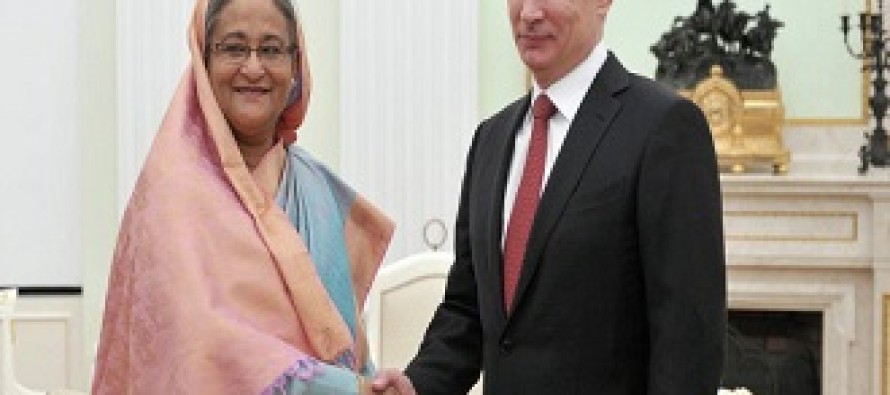Why did Russia support the new Hasina government?

It is reported that on 11th January, Russian foreign ministry issued a statement backing the January 5 general elections in Bangladesh and said it was ready to continue constructive partnership with the next government..
Russia also regretted that the key opposition parties in Bangladesh boycotted the elections “We hope that the authorities and the opposition will not go beyond the Constitution in order to ensure stability and strengthen democratic institutions in the country,” it added.
Furthermore on 14th January President Putin congratulated PM Sheikh Hasina for being the prime minister of Bangladesh for the third time. .
The above Russian foreign Ministry statement has three elements:
(a) it is ready to work with the new Hasina government,
(b) it criticises BNP for boycotting the election and
(c) it supports the Bangladesh’s current constitution which was amended in 2011 removing the provision of the non-party caretaker government.
Russia has thrown its weight fully behind the Prime Minister Sheikh Hasina at a time when her government has been desperately looking for international support.
The Russian statement and congratulatory message to PM stand at stark contrast to the position of the Western countries including the United States over the elections.
Why did Russia support?
The Hasina government took a decisive step to consolidate its relations further last year when the Prime Minister visited Moscow to have bilateral meeting with President Putin. This was to send a clear signal to the US and other Western countries that Bangladesh did not put all the eggs in one basket.
At the time criticism were made about the Prime Minister’s visit to Russia as it seemed a strategic shift of foreign policy which might alienate the US, with which Bangladesh is tied with trade, investment and developmental aid.
The Hasina government decided to restore the friendly relations which was built early post-independence period because Moscow supported the cause of Bangladesh Liberation War during 1971 while the US and China who had sided with Pakistan.
It may be recalled that Bangabandhu Sheikh Mujibur Rahman visited the Soviet Union in April 1972 immediately after Bangladesh became independent. Later he went to Moscow for medical treatment.
During the first term as Prime Minister (1996-2001) her government re-engaged Russia for mutually beneficial interactions and procured 10 MiG 21s from Russia. As a gesture of goodwill toward Russia, on 27th March, 2012 late Admiral Zuenko was awarded a medal by the Hasina government in recognition to his contribution in quickly clearing mines from the Chittagong port in 1972.
During the visit of the Prime Minister to Russia in January 2012, Bangladesh inked its biggest arms contract worth $1 billion with Russia, which also announced a $500 million loan to Dhaka for the construction of the country’s first nuclear power plant. The two major deals were announced after Russian President Vladmir Putin met on January 15 last year after talks with Prime Minister Sheikh Hasina.
Bangladesh with Russian assistance decided to install a 2,000 MW third-generation nuclear power plant (reactors) at Rooppur (Pabna) to meet its future energy needs. The estimated cost of the each proposed plant is reportedly set $1.5-2bn. It is also reported that Russia may provide state loan with interest to Bangladesh to build the plants. Russia announced a $500 million loan to Dhaka for the construction of the country’s first nuclear power plant.
In April, 2012, three subsidiary companies of the state-owned Petrobangla signed a $193.5-million agreement with Russia’s Gazprom Company for drilling 10 gas wells in Bangladesh.
Under the deal, Gazprom will construct the drilling pad and warehouse, rig shifting and commissioning, procure drilling materials and engage with third party service providers, among other things.
It is noted that last November, in the first round of voting Bangladesh supported the Russian city of Ekaterinburg, instead of Dubai of the United Arab Emirates (UAE) to win its bid to become the venue for World Expo 2020. This surprised everyone because it was deemed detrimental for Bangladesh-UAE relations with particular reference to resumption labour visa issue. This stance of Bangladesh must have pleased Russia. (Since Russian city could not win in the first round, Bangladesh finally voted for Dubai which had won beating Ekaterinburg, Izmir of Turkey and Sao Paulo of Brazil.
Conclusion:
Bangladesh does not need to choose between US and Russia and it can have good relations and the Hasina government is fully aware of this. Dhaka’s policy towards the US and Russia needs to be well-calibrated and balanced.
Observers believe close interaction with Russia, a veto wielding power at the UN Security Council, has been a mature policy of the Hasina government and now it is amply vindicated by the support lent by Moscow at the critical hour of her new government.
Moscow, as a global power, continues to have a solid foothold in India and does not want South Asian countries fall under the increasing influence of the US in South Asia. Although Moscow and Beijing are strategic partners against the domination of the US, their interests differ in South Asia. While Moscow looks at Indian growing influence in South Asia as positive, China does not. Further Bangladesh is strategically important to China and India because of Myanmar being its neighbor where their interests collide.
Finally the implication of the Moscow brief statement is huge internationally because it has been noted by the Western governments including the US. It will not be easy for the Western countries to exert pressure on the Hasina new government at least from the UN, such as suspending the recruitment from Bangladesh for UN peacekeeping missions, because Moscow has veto power in the Security Council, the executive organ of the UN.


